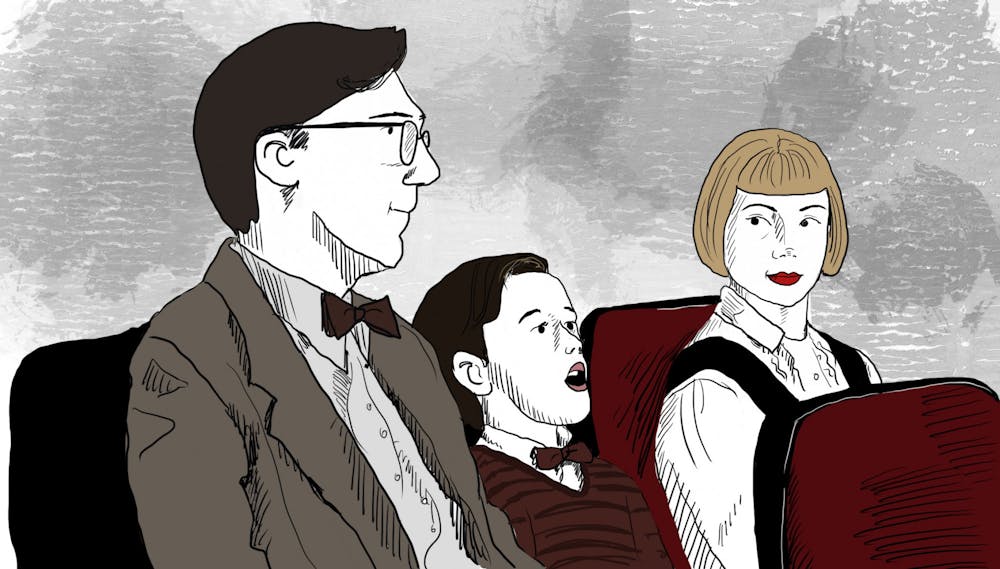Steven Spielberg is a filmmaker who feels immune from criticism. Over the past 50 years, he has reshaped the landscape of cinema more than anyone else. He tells stories that spark the imagination of viewers — films full of excitement, intrigue and emotional depth. But sadly, in his most personal film yet, none of these factors are present. And in the few moments when they are there, Spielberg’s work is watered down from what he has shown he can achieve.
“The Fabelmans” is Spielberg’s newest film. It tells the story of Sammy Fabelman (Gabriel LaBelle), who is Spielberg himself in every way except name, as he falls in love with the art of filmmaking while his parents’ relationship begins to fall apart. The film is more concerned with interpersonal dynamics than plot. While this is not inherently a bad thing, when the relationships lack complexity and there’s no story to fall back on, the film becomes tedious to watch. And at two and a half hours long, this tediousness is unrelenting.
The film’s relationships feel overly formulaic, relying too heavily on worn-out tropes to convey emotional depth. The irony is that Spielberg pioneered these now well-worn tropes in his earlier movies. But Steven Spielberg in the 2020s is not Steven Spielberg in the 70s and 80s. His tropes no longer have the effect they once did.
That’s not to say that Spielberg can no longer craft a beautiful shot or put together a great scene. Moments scattered throughout the film evoke an awe-inspiring wonder, but they get lost in the mix of the rest of the movie, which is simply just boring. The opening scenes, which feature a younger Sammy Fabelman (Mateo Zoryon Francis-DeFord), are the film’s greatest moments by a mile. As a stand-alone short, these scenes would be wonderful. It opens with Fabelman going to his first ever movie, “The Greatest Show on Earth.” Within the movie, there is a scene of a train crashing into a car that is framed to look as if the train will burst out into the audience. This scene haunts Fabelman, and he’s only able to get over this feeling by recreating the scene with his dad’s Super 8 camera and a model train set. Everything in this opening is close to perfect — stunning shots, a deep look into the catalysts of creative ambition and a feeling of intention. It knows what it wants to accomplish and does so in a way that doesn’t linger longer than it should. Unfortunately, this is only about 15 minutes at the very beginning, and the rest of the film is far more aimless in its ambition.
Besides Sammy, it's his parents, Mitzi (Michelle Williams), a romantic pianist, and Burt (Paul Dano), a pragmatic computer engineer, that constitute the remainder of the film. Mitzi and Burt’s ideological divide over Sammy’s pursuit of filmmaking serves as one of the central conflicts in the movie. Burt’s best friend and adopted uncle to the Fabelman kids, Bennie (Seth Rogen), complicates this relationship in ways that slowly reveal themselves. Mitzi’s character lacks depth and is at times way overdone. On the other hand, Burt is one note — but with an actor as great as Paul Dano playing him, that one note sounds pretty damn good. Seth Rogen proves that he is able to hold his own against heavy hitters such as Dano and Williams, even though he just plays a slightly more serious, slightly less crude version of his standard characters.
The real downfall of the film lies with its screenplay. Co-written by Spielberg and longtime collaborator Tony Kushner, the script fails at delivering quality dialogue. Someone like Noah Baumbach, who simply has a better ear for writing these kinds of relationships, would be better suited to tackle this story. The script as it’s presented doesn’t have quite what’s needed to make the film hook the viewer from beginning to end.
The issues of “The Fabelmans” have nothing to do with a lack of talent behind the scenes — there’s just not a strong enough structure in the narrative to support all the talent. Spielberg knows what he’s doing — and it would be blasphemous to put that into question — but still misses the mark. It’s obvious that this project was immensely personal to him, and all that really matters at the end of the day is if he was satisfied with his story. If he is, then great — he’s a legend who deserves to be happy with his work. But outside of Spielberg’s mind, the film just doesn’t make the impact that it really should.

Finn Kirkpatrick was the senior editor of multimedia of the Brown Daily Herald's 134th editorial board. He is a junior from Los Angeles, California studying Comparative Literature and East Asian Studies. He was previously an arts and culture editor and has a passion for Tetris and Mario Kart.





